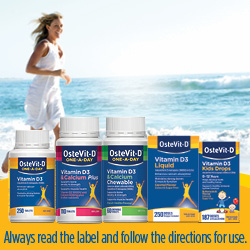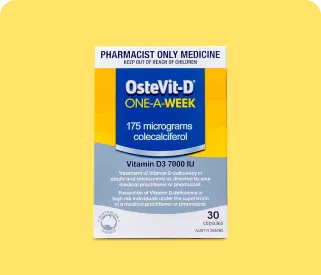About Vitamin D
What is Vitamin D?
Vitamin D is essential for supporting bone health, muscle function and healthy immune system function1. The main role of vitamin D is to enhance the absorption of calcium to maintain healthy bones. Low vitamin D levels can result in weak bones and make it more difficult for your body to absorb calcium from food.
There are two types of Vitamin D1. Vitamin D3 is our main source of vitamin D and is produced in the skin from the action of sunlight. It is also found in some foods such as oily fish, eggs and red meat. Vitamin D2 is found in plants, such as some mushrooms. However it is almost impossible to get adequate vitamin D intake from diet alone.
Vitamin D deficiency is common in Australia, with over 30% of adults having low levels of vitamin D2.
Factors that can increase your risk of having low vitamin D levels include:
- People who are less likely to spend time in the sun, such as office workers and shift workers
- People with darker skin
- People who wear modest clothes, covering most of their skin
- Older adults and people living in aged care facilities
- Infants if the mother was vitamin D deficient during pregnancy


Vitamin D and Diet
Most of us only get about 10% of our daily requirement from food. Vitamin D is mainly found in oily fish e.g. salmon. It is almost impossible to get adequate vitamin D intake from diet alone1.
The table below shows the dietary sources of vitamin D3.
| Source | Vitamin D content |
| Salmon (canned) | 300-600IU per 100g |
| Sardines (caned) | 300 IU per 100g |
| Tuna (canned) | 230 IU per 100g |
| Egg yolk | 20 IU per yolk |
| Shitake Mushrooms (fresh) | 100IU per 100g |
Benefits of Vitamin D
- Enhances calcium absorption
- Maintains bone density and strength
- Supports bone health and muscle function
- Supports healthy immune system function

About Bone Health?

Eat foods rich in calcium such as milk, yoghurt and green leafy vegetables.

Have safe exposure to sunlight – our main source of vitamin D.

Be physically active for at least 30 minutes on most days of the week.

Take a Vitamin D and/or Calcium supplement if you do not get enough through your diet and lifestyle.
Sources:
- NH&MRC Nutrient Reference Values for Australia and New Zealand, Version 1.2, 2017.
- Ebeling PR, et al. Building healthy bones throughout life: an evidence-informed strategy to prevent osteoporosis in Australia. Med J Aust. 2013;199:S1-S46
- Di Marco N, et al. Shedding Light on Vitamin D Status and Its Complexities during Pregnancy, Infancy and Childhood: An Australian Perspective. Intl. J. Environ. Res. Public Health. 2019, 16, 538.
